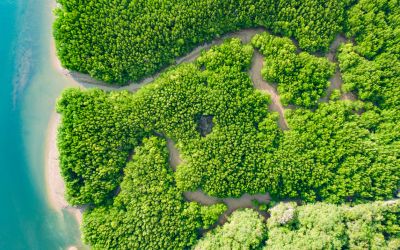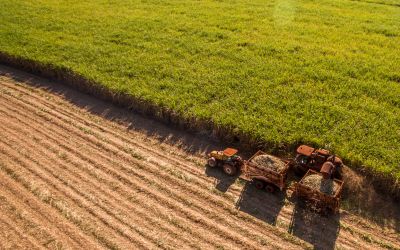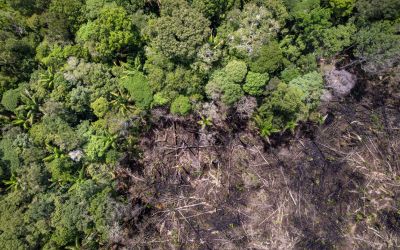Christmas could resolve Georgia’s rural crisis
The economy of post Soviet Georgia could be helped if it were to take control of its natural resources and operate efficiently and sustainably in the highly profitable Christmas tree industry.

 The economy of post Soviet Georgia could be helped if it were to take control of its natural resources and operate efficiently and sustainably in the highly profitable Christmas tree industry.
The economy of post Soviet Georgia could be helped if it were to take control of its natural resources and operate efficiently and sustainably in the highly profitable Christmas tree industry.
The problem in the struggling sovereign state close to the Russian border is that the government is seen to dominate industry and does not realise the potential of the state's natural resource of pine cones.
According to Steven McNulty PhD from the US Department of Agriculture (USDA) Forest Service, climate change is having an effect on Georgia's forests and natural resources, with water stress, inefficient land use, population increases and temperature changes impacting trees and biodiversity. For the environmental and social situation to stabilise the country needs to work towards sustainability in the Christmas tree industry.
According to Angus Crawford in his BBC Radio 4 show on 6th December 2010 'Crossing Continents: Georgian Fir Cones', the Christmas tree industry in Europe is worth almost £1billion a year.
Crawford's travel to Georgia uncovered poverty at the heart of the Christmas tree industry. According to the programme, locals say there are no jobs in the villages so they are forced to work in the forest.
Agriculture dependent families in rural areas are only able to feed themselves and they do not make any money so that they may profit, states Crawford. "Tax is paid on every bag sold but only a small proportion comes back to the locals," he adds. The problem is insistent and communities are finding it impossible to escape since there is no private credit available so that they can buy grain and livestock and invest in their own business interests.
Demand is high in the industry, so communities need to find a way to supply products in a sustainable fashion that profits them as well as continued resource growth. There's great potential but locals can't capitalise on it. According to Dr Makharashvili, from Green Alternative, featured in the Radio 4 programme: "the trade in pine cones is a good illustration of how little power local people have over their natural resources."
The desire is for communities to be given the opportunity to take ownership of the country's natural resources, and subsequently become equipped with skills and knowledge.
"Georgia which exports most of the seed for Europe to grow Christmas trees, reimports Christmas trees probably grown from its own seed," says Crawford. With regard to the economy in Georgia as a whole, he states: "Too often just like the Christmas tree trade locals get paid too little and the profits go abroad"
Other recent reports have also highlighted the dangers of the pine cone trade - workers climb trees to collect pine cones with no safety equipment leading to injuries and deaths. "Many still haven't been given safety gear by the companies that buy their cones," states Crawford.
"The plight of the pine cone pickers reflects a wider truth about the country today. Over the last 20 years most of its neighbours have begun to prosper. Georgia has been left behind," states Crawford.
There is the potential for Georgia to protect its natural resources and manage the industry in a sustainable way so that the state could prosper however there are hurdles to overcome.
"Georgias economy is still only 60 per cent of what it was in communist times," states Crawford. Dr Makharashvili voiced concern that the state only enjoys half a democracy as people have little influence on political decisions.
Transparency is also a problem. "The new western leaning government promised greater accountability and a crack down on corruption. It also begun the wide scale privatisation of state assets…..trying to uncover who's now in charge isn't easy" said Crawford
When Dr Makharashvili was asked by Crawford who he thinks owns most of the big businesses in Georgia, he said: "It looks like Russia."
Russia has enforced control on the Georgian economy in other areas too. In 2006 it issued a blanket ban on imported wine from Georgia so producers had to find another market. This was found, predominantly in the US, however it was significantly less profitable.
Danish Marianne Bols, the driving force behind Fair Trees Christmas tree nursery, has taken initiative in the profitable pine tree business in a sustainable way. She sells Georgian pine trees in Denmark, allowing Georgian businesses to profit. She told Crawford that she believes many industries can learn from this progress in the pine cone industry.
Government is required to respond to the needs of agriculture dependent communities in Georgia as well as the nations natural resources. Whilst stakeholders in the industry wait and the situation worsens, collaboration between non governmental organisations and communities could create a movement for industry improvements and a more prosperous future for Georgia's people and its forests.
Author: Marianna Keen | Climate Action
Image: wolfsavard/ Flickr




_400_250_80_s_c1.jpg)

